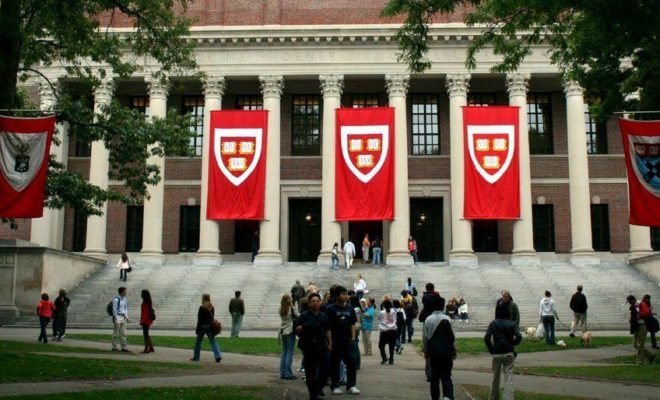Business
Parliamentary Panel Questions Tata Trusts’ Rs 325 Crore Donation to Harvard

Harvard campus
Photo: Wikimedia Commons
The parliamentary panel has proposed creating an expert group for systematic evaluation of trusts, saying they have been committing “blatant tax violations.”
A parliamentary panel has questioned the Tata Trusts’ donation of Rs 325 crore for an academic and residential building — Tata Hall, named in the honor of Ratan Tata — at Harvard Business School in Boston in the United States, the Print reported.
Ratan Tata, the chairman of Tata Group , is a Harvard alumnus and had received the Alumni Achievement Award in 1995.
The panel, which asked why public charity money is being spent on foreign universities when underprivileged students in India are protesting against lack of funds and scholarships, has proposed creating an expert group under the Income Tax Department for creation of a procedure for proper and systematic evaluation of trusts, saying charitable institutions have been committing “blatant tax violations.”
The panel, which is Public Accounts Committee’s sub-committee on direct and indirect tax, is headed by BJP MP Nishikant Dubey and includes BJP MPs Bhupender Yadav and Shivkumar Udasi as its members, among others.
Tata Trusts has denied allegations of tax violations and misuse of concessions. “There are no violations by Tata Trusts, either in supporting educational and research activities in overseas institutions, in IT compliances, or in the Trusts’ investments,” it said to the Print.
It added that the support for the establishment of Tata Hall at Harvard Business School was in recognition of its direct contribution to India, pointing out that Harvard Business School has educated more than 400 MBAs and over 2,200 executives and senior government leaders from India in the last decade.
The report by the panel will be presented before the parliament soon. The report observes that in June 2014, the Central Board of Direct Taxes (CBDT) rejected the application for tax exemption of such foreign donations on the grounds that there was no international welfare in which India was interested. The decision was reversed in 2015 “without assigning any reason,” the panel noted.
The panel cited documents from CBDT to say that the construction of Tata Hall at Harvard Business School “did not amount either to charity or international welfare in which India was interested” but was for the “promotion of personal interest of one/some of the trustees” of various Tata Trusts.
“The funds for the said donations were received from group companies and other Tata Trusts. The group companies sponsoring such grants to Harvard Business School for Tata Hall claimed it as business promotion expenses, as can be seen from their annual accounts (e.g. accounts of M/s Tata Motors Ltd for 2010-11)… The purposes for which the donation was made did not match with the objects of the trust,” the Print cited one MP privy to panel deliberations as quoting from the report.
“The contributions to overseas educational institutions by the Trusts are completely aligned with the charitable mandate of the Trusts and have qualified for tax exemption by the income tax authorities under the prevailing laws. This support is an extension of Tata Trusts’ role in nation building,” the trust said in response to the website.

You must be logged in to post a comment Login